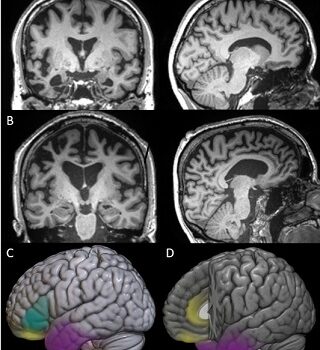Impaired social behaviour is a common manifestation of frontotemporal dementia (FTD), a neurodegenerative disorder associated with atrophy in the frontal and temporal lobes. These social changes are commonly associated with the behavioural-variant of FTD (bvFTD) and prefrontal cortical atrophy, but occur in the semantic dementia subtype of FTD too, following anterior temporal lobe atrophy. Although the frontal and temporal lobes are both implicated in social cognition, the exact contribution of each region is not clear. This is a key gap in clinical knowledge and an unresolved theoretical issue in cognitive neuroscience.
Researchers from the MRC Cognition and Brain Sciences Unit (MRC CBU) have put forward a model of impaired social behaviour in FTD. We propose that impaired social behaviour can result from damage to two distinct yet interacting components. The first component is social-semantic knowledge, which is underpinned by the bilateral anterior temporal lobes. The second is social control, including selection, evaluation, decision-making and inhibition, supported by frontal regions including the orbitofrontal and medial prefrontal cortex. Impaired social behaviour in FTD may result from damage to either of these components (or both). Crucially, the model not only explains the findings from FTD, but also assimilates findings from other patient groups, comparative neurology and cognitive neuroscience studies of the healthy brain. Understanding the cognitive and neural basis of impaired social behaviour is critical for improving symptomatic treatments in FTD, and for the development of neuropsychological tests which are sensitive to social-semantic vs social control deficits.

 MRC Cognition and Brain Sciences Unit
MRC Cognition and Brain Sciences Unit


